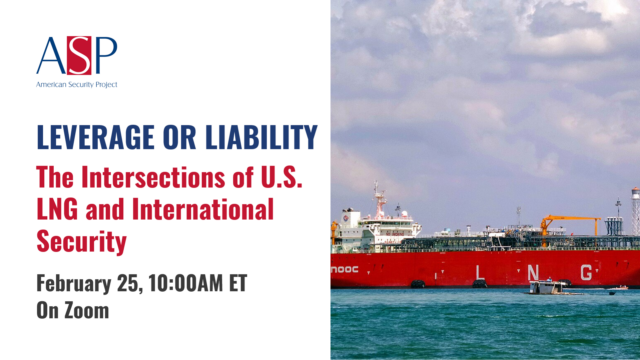
Event Recap: Leverage or Liability: The Intersections of U.S. LNG and International Security
On February 25, 2025, ASP held an online webinar discussing the opportunities and challenges at the intersection of U.S. liquified natural gas (LNG) and international security. Moderated by ASP CEO Matthew Wallin, the panel included BG Steven Anderson, USA (Ret.), Dr. Agnia Grigas of the Atlantic Council, and Leslie Palti-Guzman of CSIS.
The panel discussed the state of American LNG production with a focus on LNG’s role in geopolitics, U.S. energy leadership, the shifting landscape of energy security and global markets, and its environmental impact.
BG Anderson focused on the security risks associated with dependency on carbon-based fuels, “…I strongly believe that the United States’ overreliance on carbon-based fuels makes us all less safe.” He stressed that while LNG may be a transitional energy source, it should be priced higher to encourage the shift to renewable energy and reduce vulnerabilities tied to its supply chains.
Dr. Grigas examined the U.S.’ emergence as a global energy superpower, particularly through LNG exports, which have helped support European allies during the war in Ukraine. She noted that while U.S. LNG has greatly diminished Russia’s gas monopoly, Gazprom, in Europe, it is still bolstered by remaining a formidable player in energy markets, particularly in Asia.
Leslie Palti-Guzman also underscored the importance of maintaining energy diversity, as Europe has learned the hard way from overdependence on Russian gas. Also, while the U.S. is a critical player in global LNG markets, it must continue to innovate in both traditional and renewable energy sectors to ensure long-term energy security, stating that “…many emerging markets are progressing with renewable targets.”
As the global energy market continues to evolve, the speakers all agreed on the need for a balanced approach that incorporates both short-term security needs and long-term sustainability goals. Energy transitions are not occurring at the same pace globally, and the U.S. must navigate its role carefully, ensuring that energy policies and exports support economic growth and national security.
A recording of the webinar can be found below.






